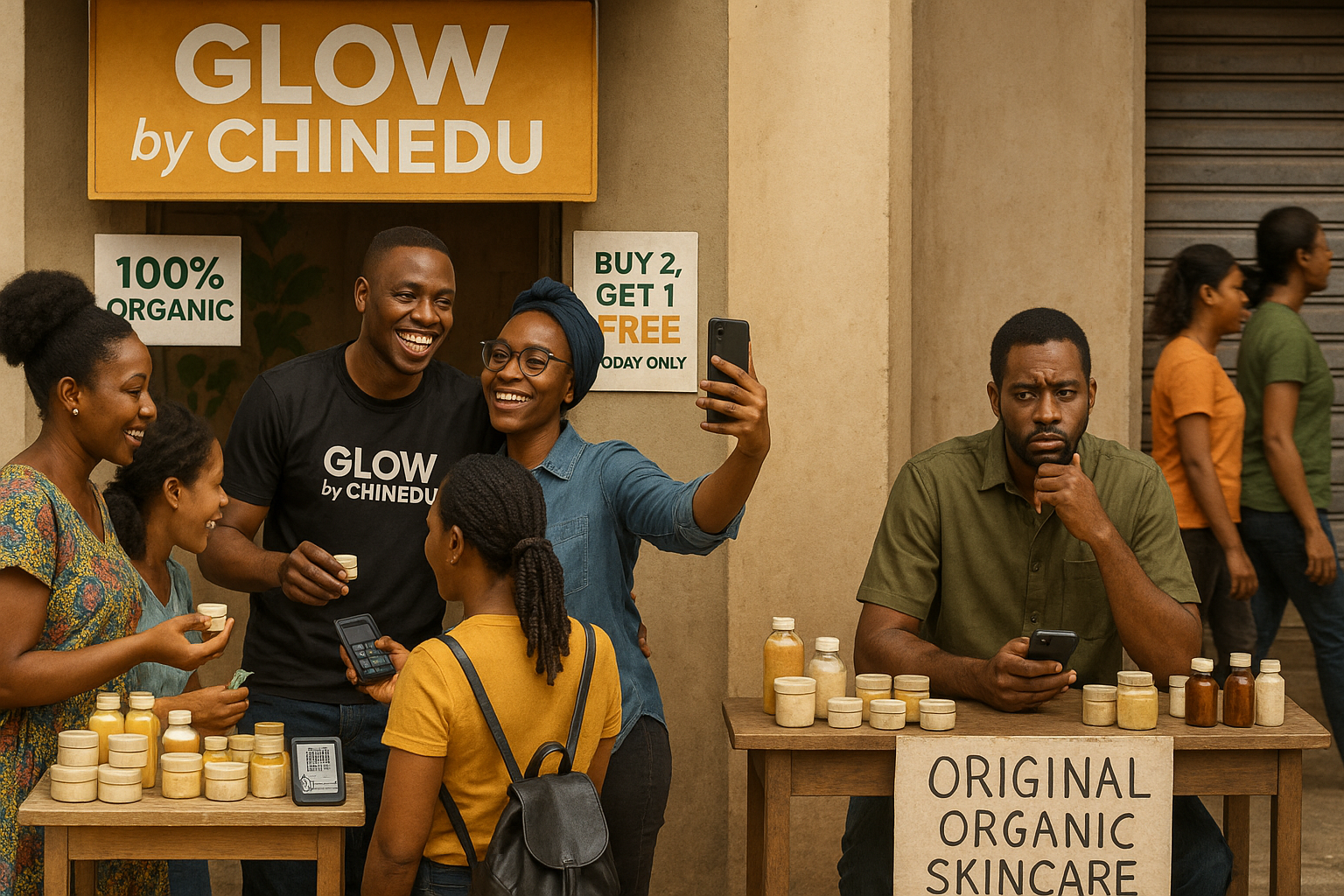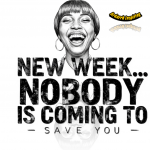In today’s crowded market, it’s not enough to simply sell a good product — how you present and promote it can determine everything.
Let’s paint the scene:
Two Nigerian entrepreneurs, Chinedu and Emeka, both arrive early at the same bustling local market. Each has a table filled with 100% organic skincare products — shea butter blends, black soap, natural oils, and scrubs. Both believe in the quality of what they sell. Yet, by midday, Chinedu’s stall is surrounded by smiling customers, while Emeka sits alone, frustrated and unnoticed.
Why?
This real-world contrast teaches powerful business lessons — especially for freelancers, small business owners, and creatives trying to stand out in a noisy digital or physical marketplace.
1. Presentation is Power
Chinedu shows up with a clear identity. His business name, Glow by Chinedu, is boldly printed on a banner behind him and on his T-shirt. His products are arranged in neat rows. Labels are professionally printed. There’s a sign offering a “Buy 2, Get 1 Free” promotion. He even has a visible QR code on the table for easy online orders or Instagram follow-up.
Emeka, on the other hand, has a plain table. His products are the same — maybe even from the same supplier — but they’re unlabeled or poorly packaged. A handwritten sign says, “Original Organic Skincare,” but that’s all. No branding. No strategy. No presence.
People don’t buy just what you sell. They buy what they see, feel, and remember.
2. Branding Builds Trust
Imagine walking into two stores. One has clean packaging, a visible logo, and consistent colors. The other looks like someone just threw items together from their kitchen. Which would you trust more?
Chinedu’s branding sends a subconscious message to every passerby: This person is serious. This product is trustworthy. This business is real.
Emeka’s unbranded, unpolished approach leaves room for doubt. “Is this safe?” “Is this even legitimate?” “Can I find this seller again?” These are the silent questions running through customers’ minds.
Your brand doesn’t have to be expensive — but it must be intentional.
3. Marketing Isn’t Loud, It’s Smart
Chinedu isn’t shouting to get attention. Instead:
- He offers a limited-time deal (“Buy 2, Get 1 Free”)
- He encourages customers to share their experience by taking photos
- He displays a QR code for WhatsApp or Instagram
- He lets his happy customers do the talking
That’s simple, smart marketing.
Emeka, unfortunately, waits for people to come to him. But in business, waiting passively is rarely a winning strategy. You must give people a reason to stop, look, and buy.
4. People Buy People
More than the product, people are drawn to energy, confidence, and connection.
Chinedu is smiling, engaging, and informative. He interacts with people — asking questions, giving samples, listening to feedback. You can tell he enjoys what he does. That emotional energy is contagious.
Meanwhile, Emeka looks tired and defeated. He scrolls on his phone, occasionally looks up, but isn’t initiating any conversations. Even if his product is good, his demeanor doesn’t inspire confidence.
In Nigeria — and globally — people are more likely to buy from someone who feels approachable, relatable, and passionate.
5. The Power of Visibility (Online & Offline)
Let’s assume a customer isn’t ready to buy today. What’s the next best outcome? That they follow you online, save your contact, or take a flier. That’s future business.
Chinedu gets that. His QR code links to his Instagram page, filled with testimonials, before-and-after pictures, and videos of his production process. It builds authenticity and brings him repeat customers.
Emeka, however, doesn’t have any visible online presence. Once a passerby walks past his stall, that’s the end of the interaction. No follow-up. No digital footprint.
Every single day you sell without visibility is a missed opportunity.
6. Same Product, But One Is Positioned Better
Positioning is not about being better — it’s about being perceived as better.
Chinedu and Emeka might be using the same shea butter supplier from Kaduna. But Chinedu positioned his product as a lifestyle brand that helps customers glow naturally. Emeka positioned his as just skincare.
Which one sounds more exciting?
Whether you’re selling graphics, CV writing, or even akara — how you position your service affects how much people are willing to pay for it.
7. Lessons for Creatives, Freelancers, and Small Business Owners
If you’re reading this and you’re struggling to attract customers despite having great skills or products, here’s your checklist inspired by this story:
• Do I have a clear brand name and logo?
• Is my product or service visually appealing and well-presented?
• Am I giving potential customers a reason to stop and engage?
• Do I have an active and visible online presence?
• Am I communicating my value consistently — in person and online?
Remember: You may be the best at what you do, but if no one knows, no one buys.
Final Thoughts: It’s Not Just the Product
There are millions of skilled entrepreneurs doing amazing things — from handmade crafts to tech solutions, fashion to food, writing to wellness. But many stay stuck, not because of what they’re selling, but because of how they’re selling it.
This story of Chinedu and Emeka is a mirror.
Are you showing up like Chinedu or sitting back like Emeka?
In a world full of noise, packaging, presentation, and positioning make the difference between a product that gathers dust and one that sells out.
Ready to Transform Your Brand?
Whether you need:
- Eye-catching graphics
- A story-driven website
- An engaging LinkedIn profile
- A personal brand strategy that sets you apart…
I help creatives, small business owners, and professionals like you present their ideas with confidence.
📩 Send me a message today or WhatsApp me via [07717069491]
📧 Email: hello@ardarrhinspiring.com
🌐 Website: www.ardarrhinspiring.com
Let’s make your business the one everyone wants to buy from.








